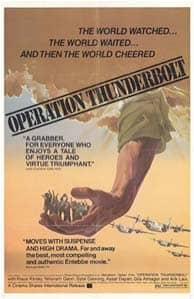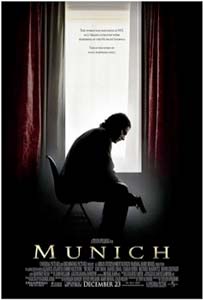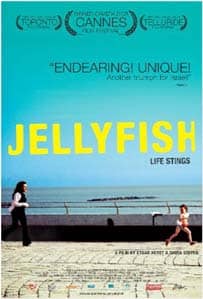The Raid on Entebbe
The numerous films made in the aftermath of the 1976 raid on Entebbe, Uganda, to free Israeli hostages held captive by the PLO and Idi Amin, offered up Israelis as master warriors. They also presented seemingly infinite comic possibilities of well-regarded English and American actors pretending to be Israeli, and even funnier matchups of actors and famous Israelis: Richard Dreyfuss as the martyred Yonatan Netanyahu, Anthony Hopkins as Yitzhak Rabin, and Burt Lancaster as Shimon Peres in 1976's television movie Victory at Entebbe (which had the added pleasure of onetime shiksa goddess Elizabeth Taylor in a small role).
 The film (along with the 1977 Israeli version, Operation Thunderbolt) was more a quick cash-in on Entebbe than a serious film, but it is also a goldmine of ludicrous accents, hairstyles, and wardrobes. The unbuttoned white shirts and copious chest hair of the Israeli politicians are particularly notable in their unintentionally parodic silliness.
The film (along with the 1977 Israeli version, Operation Thunderbolt) was more a quick cash-in on Entebbe than a serious film, but it is also a goldmine of ludicrous accents, hairstyles, and wardrobes. The unbuttoned white shirts and copious chest hair of the Israeli politicians are particularly notable in their unintentionally parodic silliness.
After Entebbe, Israelis mostly disappeared from American movies, with a handful of exceptions like Costa-Gavras' well-intentioned courtroom drama Hanna K. (1983), with Jill Clayburgh as an American expat attorney in Jerusalem who defends an accused Palestinian terrorist while carrying on a love affair with the prosecutor.
Modern Portrayals
In recent years, the Israeli trend has re-emerged, with Steven Spielberg's Munich (2005) at the forefront. Munich retains the stunt-casting, "that-guy-couldn't-possibly-be-Jewish" feel, with future James Bond Daniel Craig as a South African explosives expert, and Aussie Geoffrey Rush as a Mossad case officer. Eric Bana is more serviceable as Avner, an ex-Mossad agent turned global vigilante, but Spielberg's film, in small doses, went with the most audacious Hollywood casting decision of all: having Israeli actors depict themselves.
 Acclaimed Israeli actresses Ayelet Zurer and Gila Almagor played Avner's wife and mother, respectively. For Zurer, her role in Munich has led to an increasingly high-profile career in American films, with roles in Vantage Point (2008) and Angels & Demons (2009).
Acclaimed Israeli actresses Ayelet Zurer and Gila Almagor played Avner's wife and mother, respectively. For Zurer, her role in Munich has led to an increasingly high-profile career in American films, with roles in Vantage Point (2008) and Angels & Demons (2009).
With Israeli television shows and movies (like Be'Tipul, or Cannes prizewinner Jellyfish) in such hot demand of late, more Israelis are likely to obtain roles in non-Israeli films. In part, this is due to the globalization of present-day Hollywood, in which actors from around the world are offered roles. But it also has something to do with Israel's cinematic and literary successes in the past decade.
 American film's newfound interest in performers from around the world offers the possibility of Israeli performers getting to play big-screen versions of themselves for worldwide audiences. In all likelihood, though, future depictions of Israelis onscreen will continue to feature American stars doing their best with the tricky Israeli accent, with the men displaying copious chest hair and the women showing off henna-rinsed hair. But even a few Israeli actors getting the opportunity to play themselves--so to speak--could make for a new kind of Israeli in the movies.
American film's newfound interest in performers from around the world offers the possibility of Israeli performers getting to play big-screen versions of themselves for worldwide audiences. In all likelihood, though, future depictions of Israelis onscreen will continue to feature American stars doing their best with the tricky Israeli accent, with the men displaying copious chest hair and the women showing off henna-rinsed hair. But even a few Israeli actors getting the opportunity to play themselves--so to speak--could make for a new kind of Israeli in the movies.
This article was first posted at MyJewishLearning.com, a Patheos Partner, and is reprinted with permission.
Saul Austerlitz is a writer and film critic in New Yo




